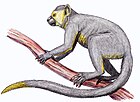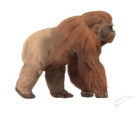| Propliopithecus Temporal range: Paleogene–Neogene PreꞒ Ꞓ O S D C P T J K Pg N | |
|---|---|

| |
| Propliopithecus haeckeli | |
| Scientific classification | |
| Domain: | Eukaryota |
| Kingdom: | Animalia |
| Phylum: | Chordata |
| Class: | Mammalia |
| Order: | Primates |
| Suborder: | Haplorhini |
| Infraorder: | Simiiformes |
| Superfamily: | †Propliopithecoidea |
| Family: | †Propliopithecidae |
| Genus: | †Propliopithecus Schlosser, 1910 |
| Type species | |
| †Propliopithecus haeckeli Schlosser 1911 | |
| Species | |
| |
| Synonyms | |
| |
Propliopithecus is an extinct genus of primate.
The 40 cm (1 ft 4 in) long creature resembled today's gibbons. Its eyes faced forwards, giving it stereoscopical vision. Propliopithecus was most likely an omnivore. It is possible that Propliopithecus is the same creature as Aegyptopithecus. If that would be the case the name Propliopithecus would take precedence over Aegyptopithecus according to ICZN rules, because it was coined earlier.
Human-like dental features
Propliopithecus had small canine teeth, lacked spaces to fit the canine teeth of the other jaw into, and had molars very similar to those of Australopithecus. These features set Propliopithecus apart from Aegyptopithecus, which had big canine teeth along with other more normal simian dental features.
References
- "†Propliopithecus Schlosser 1911 (monkey)". FossilWorks. Retrieved 20 February 2019.
- Palmer, Douglas (1999). The Marshall Illustrated Encyclopedia of Dinosaurs & Prehistoric animals. London: Marshall Editions Developments Ltd. ISBN 978-3-8290-6747-8.
- Yves Coppens: Ape, Africa and Man
- Bjorn Kurten: The age of mammals
| Taxon identifiers | |
|---|---|
| Propliopithecus | |
This prehistoric primate-related article is a stub. You can help Misplaced Pages by expanding it. |



